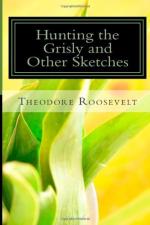On this occasion I owed my broken arm to the fact that my horse, a solemn animal originally taken out of a buggy, though a very clever fencer, was too coarse to gallop alongside the blooded beasts against which he was pitted. But he was so easy in his gaits, and so quiet, being ridden with only a snaffle, that there was no difficulty in following to the end of the run. I had divers adventures on this horse. Once I tried a pair of so-called “safety” stirrups, which speedily fell out, and I had to ride through the run without any, at the cost of several tumbles. Much the best hunter I ever owned was a sorrel horse named Sagamore. He was from Geneseo, was fast, a remarkably good jumper, of great endurance, as quick on his feet as a cat, and with a dauntless heart. He never gave me a fall, and generally enabled me to see all the run.
It would be very unfair to think the sport especially dangerous on account of the occasional accidents that happen. A man who is fond of riding, but who sets a good deal of value, either for the sake of himself, his family, or his business, upon his neck and limbs, can hunt with much safety if he gets a quiet horse, a safe fencer, and does not try to stay in the front rank. Most accidents occur to men on green or wild horses, or else to those who keep in front only at the expense of pumping their mounts; and a fall with a done-out beast is always peculiarly disagreeable. Most falls, however, do no harm whatever to either horse or rider, and after they have picked themselves up and shaken themselves, the couple ought to be able to go on just as well as ever. Of course a man who wishes to keep in the first flight must expect to face a certain number of tumbles; but even he will probably not be hurt at all, and he can avoid many a mishap by easing up his horse whenever he can—that is, by always taking a gap when possible, going at the lowest panel of every fence, and not calling on his animal for all there is in him unless it cannot possibly be avoided. It must be remembered that hard riding is a very different thing from good riding; though a good rider to hounds must also at times ride hard.
Cross-country riding in the rough is not a difficult thing to learn; always provided the would-be learner is gifted with or has acquired a fairly stout heart, for a constitutionally timid person is out of place in the hunting field. A really finished cross-country rider, a man who combines hand and seat, heart and head, is of course rare; the standard is too high for most of us to hope to reach. But it is comparatively easy to acquire a light hand and a capacity to sit fairly well down in the saddle; and when a man has once got these, he will find no especial difficulty in following the hounds on a trained hunter.




